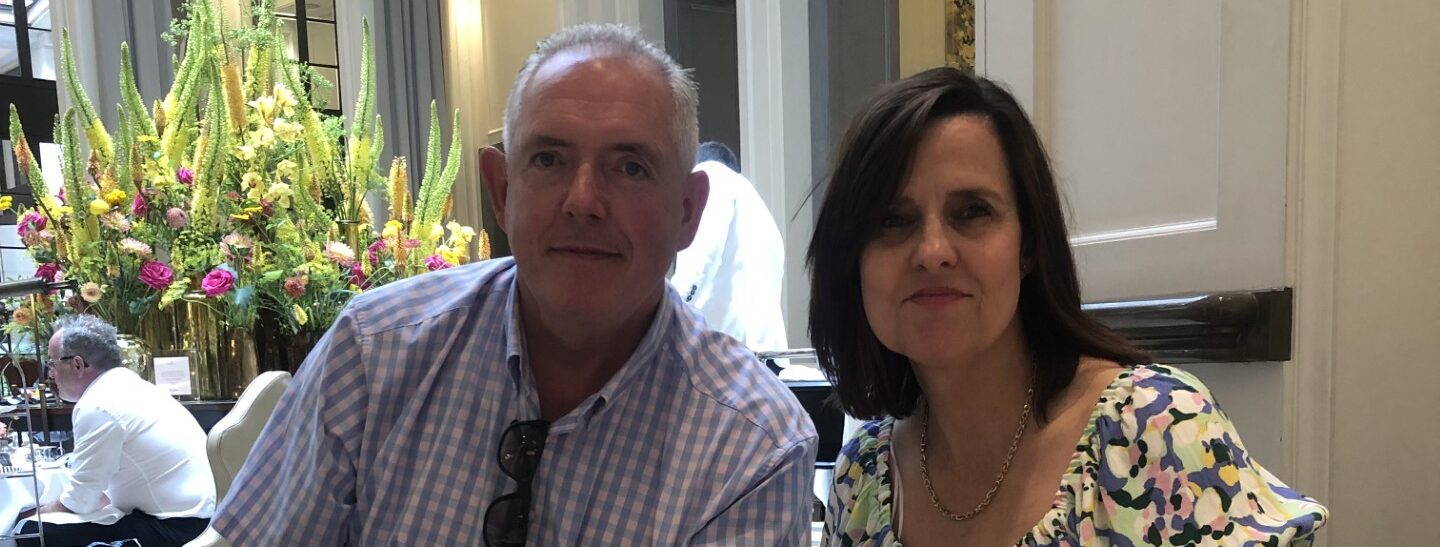
12 Jun 2025
Paul’s family pull together to combat treatment isolation
“Fortunately, I had a very good family network supporting me daily. There wasn’t a day that I didn’t see my wife, Pat, who always brought me fresh clothes and food. My dad and my kids always came to see me too. ”
Paul Byng thought he was ‘just getting old’ when in 2023 he started to feel tired and breathless. His strange symptoms lasted for six months but as Paul was under routine medical screening for another condition, he didn’t seek further tests. 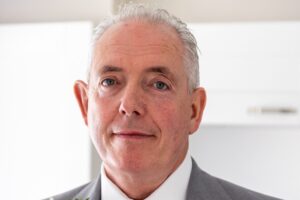
“I was so tired I was falling asleep in the middle of the day,” said Paul, 62, who lives near Portsmouth and works as a property developer. “I was 60 that year and just thought it was my age. I was also strangely breathless and suffering with extremely achey bones, particularly in my legs.”
Paul had a low platelet count in his blood for the past ten years, which doctors said was not a concern. He was under the care of a hepatologist at Queen Alexandra Hospital for non-alcoholic fatty liver, which meant a blood test and scan every six months. It was this that eventually led to Paul’s leukaemia diagnosis.
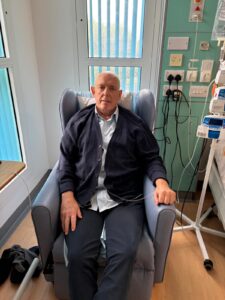
Paul whilst getting treatment
“On the evening of 20th October 2023, I was called out of the blue by the hospital. They asked me to come in the following day for a blood transfusion because the counts in my latest blood test were extremely low. This was a huge shock. I went and had the transfusion and the consultant said they needed to do some more tests, including a bone marrow biopsy. I could see in her face something was seriously wrong, but it never occurred to me it could be leukaemia.
“On 31st October I heard the words ‘I’m sorry to say you have acute myeloid leukaemia (AML) with myelodysplasia-related changes (AML-MRC)’. To this day those words still haven’t sunk in. I was told I had six mutations and 31% leukaemia blasts, but that they were going for a cure.”
Paul started four rounds of chemotherapy, each lasting up to six weeks at a time. The treatment was gruelling, leaving him suffering a bout of sepsis and other infections.
“For me, the isolation was the hardest part. I felt frustrated beyond belief. The hardest part of the day was around 5.30pm where it really dragged. I have always kept busy with work and have a big family so felt like I didn’t have time to be sick and stuck in a hospital room with my life on hold. My life was ripped away from me overnight.
“Fortunately, I had a very good family network supporting me daily. There wasn’t a day that I didn’t see my wife, Pat, who always brought me fresh clothes and food. My dad and my kids always came to see me too.
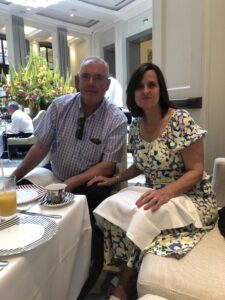
Paul with his wife Pat
“Waiting for my neutrophils to come up after each round of chemo in order to be discharged was excruciating. I would make a note of my blood results in a notebook every day when the nurse would visit each morning. I’d then share the results in our family WhatsApp group chat.”
“Watching a parent, a person who has always been there for you, go through something so devastating was torture,” said daughter Rebecca, 31, who lives in Surrey and works in PR. “Our whole family’s life was turned upside down so suddenly, but we all buckled down and did what we needed to do to support Dad through his treatment. My mum was particularly amazing and there wasn’t a day where she didn’t visit him in hospital. It was hard seeing them be apart from each other as they work together and spend most of their time with each other. We all told him to take it easy but he wouldn’t listen and would be up and about at every opportunity. That was hard to see as we were all so worried.”
Paul was told from the start that to minimise the chance of relapse he would need a stem cell transplant.
“It was overwhelming hearing about what was ahead of me. But the consultant at Southampton Hospital, where I was eventually transferred to for the transplant, was amazing and I couldn’t have asked for a better doctor to take care of me.
“I remember the day I found out I had a 10/10 match from someone on the register. I can’t put into words how thankful I am to the donor.”
Paul received his donation on 9th August 2024.
“What followed was a tough few weeks where I had extreme aches; I had never felt a pain like it. My consultant’s theory was that I was engrafting the new cells incredibly quickly, so it was a positive sign. I also had to be fed through a tube for a few days due to mucositis – an inflammation of the lining of the mouth.
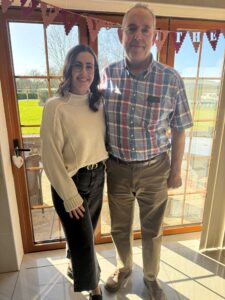
Paul and his daughter Rebecca
“Like before, the mental part of the journey was harder than the physical. Losing my hair was hard because I had no control over it, like a lot of things at the time. I had some tough nights but was pleased to be discharged in early September and go back home. I now call home my Shangri-la!”
Six months on from his transplant Paul has been told he has 99% donor cells in my system and is in remission. He is still being monitored weekly but is starting to resume and enjoy normal life once again. He is back at work and has just welcomed his fifth granddaughter.
“It is phenomenal to see the journey he has been on and I’m so proud of where he’s got to,” added Rebecca. “I think about those who haven’t been so lucky with treatment often and every day I am grateful for the outcome we’ve had. Mentally, he found the isolation quite damaging and there desperately needs to be kinder treatments that don’t leave patients so sick and alone.”
“It is always on my mind, wondering if the AML will return,” said Paul. “I did question ‘why me?’ I was fit and well, I never smoked or drank. Some days I feel flat about the whole experience, but I remind myself that not everyone is so lucky and I am so grateful to be where I am. There are positive days and the future looks bright.”
Share your story
We want to help people tell and share the leukaemia stories that matter – stories like Paul’s and stories like yours.
Related posts
21 April 2023
Trailblazing research project announced to exploit novel weaknesses in one of the least survivable cancers
A pioneering new study hopes to accelerate progress towards a new treatment for acute myeloid leukaemia (AML) in research announced today on World AML Day by Leukaemia UK. University of…
11 January 2019
Leukaemia UK and Leuka have merged
We are delighted to announce that on 1 November Leuka and Leukaemia UK merged
7 November 2024
University of Southampton’s Dr Giorgia Chiodin Wins Olive Boles Innovation Award
Dr Giorgia Chiodin from the University of Southampton has been awarded the prestigious Olive Boles Innovation Award for 2024. Awarded annually to a Leukaemia UK John Goldman Fellow, this award…
2 October 2023
Three leading charities collaborate to fight childhood cancers
New Partnership we3can to fund research into three most common childhood cancers Today (2nd October 2023), three leading cancer charities have launched a new collaboration in order to improve the…